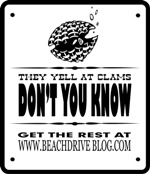UPDATE MAY 17, 2011: THE TRAPPING FOR THIS WEEK HAS BEEN CANCELLED.
UPDATE MAY 17, 2011: We did receive this from the Department of Fish and Wildlife:
Hiring a nuisance wildlife control operator (licensed trapper) is a personal decision for people. It is a service they pay for themselves. When a licensed trapper is hired they do have to euthanize the animals. When people contact us we try to give advice on how to discourage them so that they’ll go on their own, but ultimately when people in the neighborhood are feeding them (which we are trying to get a law passed that will make that illegal) it is very difficult for people to discourage them through the typical methods we suggest because the food source is just too easy for the animals to give up no matter what. We hope this helps.
It's our understanding that trapping of raccoons in certain areas on Beach Drive will begin this week by Critter Control. PLEASE BE SURE TO KEEP YOUR DOGS, CATS AND PETS INDOORS, ON LEASHES OR IN FENCED YARDS.
Critter Control, licensed and authorized by the Washington State Department of Fish and Wildlife, has been hired by a group of neighbors to trap raccoons on their private property.
Here are some things to be aware of from UW Medical regarding the health risk of raccoons:
Families of raccoons living in urban environments pull apart garbage cans and rummage through yard waste containers. Raccoons will enter homes through pet doors or other openings to get at food inside. Normally nocturnal, raccoons are now seen more frequently during the day eating pet food, garbage, excess bird seed, fruit tree droppings, and all of the other food sources we have in cities. Young raccoons learn these feeding behaviors from their parents and may never learn how to find their natural foods in the wild.
We all have to do what we can to reduce these food sources:
- Never leave pet food outside
- Ensure your garbage can lids are tightly fitting; if possible keep garbage cans in a secure place like a garage or shed until pick-up day
- Use secure bins for food composting
- Do not bury garbage
- Do not feed excess food to birds
- Pick up fallen fruit and berries
- Clean barbecue grills after each use
- Do not feed raccoons on purpose under any circumstances
Populations of raccoons are exploding in our urban and suburban environments, primarily because of the food people provide. This presents hazards to neighbors and pets as well as the raccoons, because diseases spread more rapidly when there is overcrowding. Also, more raccoons are killed or injured by cars. As wild animals, when there are fewer raccoons in cities and suburbs existing populations are better off. Please do your part to help control the raccoon population in Fauntleroy, as well as in Seattle and throughout the county.
It's unfortunate that the raccoons in question have probably been fed by humans, either on purpose or on accident by not securing their garbage. Even after the trapping is finished and the Beach Drive raccoon population has been restored to it's natural and sustainable level, neighbors need to all do what we can to prevent human encouraged overpopulation (by feeding raccoons) from happening again.
NOTE: Beach Drive Blog is not organizing the raccoon trapping – simply reporting info as we learn about it.
It's very considerate of the neighbors to have given BDB a "heads up" about this so we are all more aware of this issue and know to keep our pets in. None of the neighbors who are in this position want to be.



Speak Your Mind